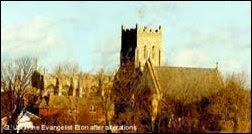We're gradually adding bits and pieces about the history of Eton and Eton Wick to the website. If you have done any research or have memories you would like to add, please email us or contact Mrs Teresa Stanton, Secretary.
_________________________________________________________________________________
 Eton Wick School - memories of Mr Moss' time as headmaster
Eton Wick School - memories of Mr Moss' time as headmaster
Vernon Moss arrived in Eton Wick with his family in 1955, having previously been headmaster of a small school in the village of Hopton, on the Norfolk-Suffolk border. Over the next 21 years he made a substantial contribution to village life. Read more......Eton Wick School Class photos
If you know any more about the pictures on this page, please let us know. Or you might have some other class photographs from Eton Wick School which we could add? Read more......
 Eton Wick School in the post-war years
Eton Wick School in the post-war years
The school diary records that the air raid shelters were removed in 1946 and school life was back to normal by 1947. As the school is of Church of England denomination an inspection by the Oxford Diocesan brought forth the following comment— Read more .......Eton Wick School: 1939 - 1945
Initially the Eton Wick School and the evacuated London County Council (L.C.C.) children shared Eton Wick’s School premises, which resulted in overcrowding of available classrooms. A trial of sharing the day with Eton Wick children attending morning class and the L.C.C. attending afternoon class. Read more......
 Eton Wick School: Events from the school log
Eton Wick School: Events from the school log
The history revealed in the log show that, and how the school community was effected local, nation and intention event. Read more......
 Eton Wick School: the beginning
Eton Wick School: the beginning
In 1831 the Reverend Henry John Chitty Harper came from Oxford to be a private tutor at Eton College. He was an enthusiastic man of strong character who did not like to be idle. It was through his energy and enthusiasm to get things improved for the poor that the first schoolroom was built in Eton Wick in 1840 Read more......
 Eton Wick Church Choir, late 1940's
Eton Wick Church Choir, late 1940's
The
Priest in Charge at Eton Wick as in the photograph is the Revd. Christopher
Hare. He lived at 10 The Cloisters, Windsor Castle, as he was also a Minor
Cannon there. He was well loved in the village, and I have a picture of a group
of children and parents sitting with him on a seaside beach (probably Southsea)
where we had gone for a church outing. Read more......A brief history of St John the Baptist

In 2013 and 2014 the Rev. Holt left the village and the Rev. Stacey came to be the new vicar. This seems an appropriate time to reflect on its conducts, priests and Vicars. Eton Wick had no church building until 1866/7 when St. Johns was built in Sheepcote. Previously services (but not the Sacraments) were held in the school room at the top of the walk, but of course that building did not exist until 1840. We are told of earlier services in a farm building, Read more......
 St. John's, Eton and the great Victorian marriage scandal
St. John's, Eton and the great Victorian marriage scandal
Imagine a whole generation of respectably married Victorians waking up to discover that they weren’t officially married at all. In 1875 this was the situation facing more than two hundred couples thanks to an administrative mix-up at read more......
Baby Clinic
 The story of Eton Wick Baby Clinic has been researched from the pages of the parish magazine and told by village resident, Joan Ballhatchet. On Friday 19th February, 1915, one of the first baby clinics in Buckinghamshire was opened in Eton Wick Village Hall. It was known as the Babies' Welcome. Read more......
The story of Eton Wick Baby Clinic has been researched from the pages of the parish magazine and told by village resident, Joan Ballhatchet. On Friday 19th February, 1915, one of the first baby clinics in Buckinghamshire was opened in Eton Wick Village Hall. It was known as the Babies' Welcome. Read more......


No comments:
Post a Comment